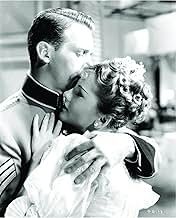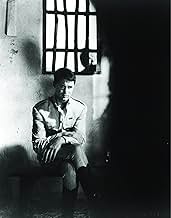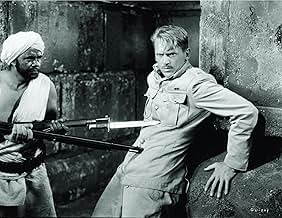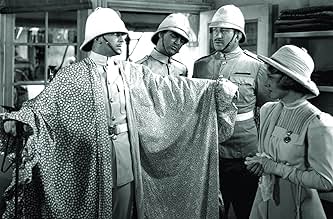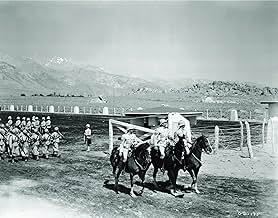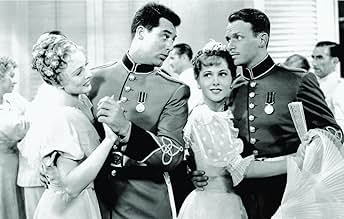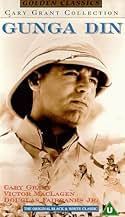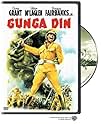Gunga Din
- 1939
- Tous publics
- 1h 57m
IMDb RATING
7.2/10
13K
YOUR RATING
In 19th century India, three British soldiers and a native waterbearer must stop a secret mass revival of the murderous Thuggee cult before it can rampage across the land.In 19th century India, three British soldiers and a native waterbearer must stop a secret mass revival of the murderous Thuggee cult before it can rampage across the land.In 19th century India, three British soldiers and a native waterbearer must stop a secret mass revival of the murderous Thuggee cult before it can rampage across the land.
- Awards
- 4 wins total
Charles Bennett
- Telegraph Operator
- (uncredited)
Gene Coogan
- Lancer
- (uncredited)
Jimmy Dime
- Thug
- (uncredited)
George Du Count
- Pandu Lal
- (uncredited)
Anna May the Elephant
- Elephant
- (uncredited)
Featured reviews
I have seen "Gunga Din" several times. It is not a strict re-telling of the Kipling work but a studio era take on it. It is jingoistic and hokey but it is an entertaining and uplifting film.
Those that bemoan the "un-PC" tone of the film need to look at it in context. The underlying theme of the piece is that these British soldiers come to hold a member of a group of people they had (until that time) regarded as savages, in higher regard than most of their compatriots. The ideas of universal human qualities and nobility are driven home in a very emotional, if a little ham-fisted way. Considering the racial atmosphere in America at the time, this was not exactly a statement without some daring.
To condemn this film or the original story for racism is to miss the point entirely. That was the time and for its time, the messages here are incredibly progressive. Besides, even if the film were racist, only a fool discards a classic piece of art because he or she disagrees with the content of the message. Pretty much all critics and film historians list Griffith's "Birth of a Nation" somewhere in the top 3 films of all time, regardless of the fact that the heroes of the picture are the KKK. The message was wrong but the film transformed the whole of film-making forever. Do we discard that too? Do we burn all copies of Joseph Conrad's novella "Heart of Darkness" because some perceive the narrator to be a bigot? To do so would be robbing generations of a classic example of well crafted storytelling at its best. Such behavior is ignorance in its basest form.
But, you know, that's just what I think.
Those that bemoan the "un-PC" tone of the film need to look at it in context. The underlying theme of the piece is that these British soldiers come to hold a member of a group of people they had (until that time) regarded as savages, in higher regard than most of their compatriots. The ideas of universal human qualities and nobility are driven home in a very emotional, if a little ham-fisted way. Considering the racial atmosphere in America at the time, this was not exactly a statement without some daring.
To condemn this film or the original story for racism is to miss the point entirely. That was the time and for its time, the messages here are incredibly progressive. Besides, even if the film were racist, only a fool discards a classic piece of art because he or she disagrees with the content of the message. Pretty much all critics and film historians list Griffith's "Birth of a Nation" somewhere in the top 3 films of all time, regardless of the fact that the heroes of the picture are the KKK. The message was wrong but the film transformed the whole of film-making forever. Do we discard that too? Do we burn all copies of Joseph Conrad's novella "Heart of Darkness" because some perceive the narrator to be a bigot? To do so would be robbing generations of a classic example of well crafted storytelling at its best. Such behavior is ignorance in its basest form.
But, you know, that's just what I think.
This old film just has some important elements the bulk of current films seem to lack: strength of character, genuine heroism and an understanding of what true altruism and sacrifice mean. And Sam Jaffe, a terrific (now-unfortunately-deceased) character actor breaks the viewer's heart as the "regimental bhisti, Gunga Din," who takes constant abuse and gives his all, including his life, to carry water to the men of the Queen's regiment even in the thick of battle.
Funny, I don't remember it as a comedy, though I think there may have been some spots of humor in it, but then, I was rather young the last time I saw it on the Late, Late Show... too many years ago to even want to think about.
It's a wonderful movie and I hope the animated version, coming out next year, does the poem and story the same good service the 1939 film managed to do.
Highly recommended.
Funny, I don't remember it as a comedy, though I think there may have been some spots of humor in it, but then, I was rather young the last time I saw it on the Late, Late Show... too many years ago to even want to think about.
It's a wonderful movie and I hope the animated version, coming out next year, does the poem and story the same good service the 1939 film managed to do.
Highly recommended.
Among my father's favorite movies that I remember were High Noon, Four Feathers (both Korda's and the silent version), and this one. Not surprisingly they've all become favorites of mine. They are certainly the "guy flicks" of their day that wouldn't stand a chance of being made that way today. But I guess that's what makes them classics never to be forgotten, because, although all are classic stories, destined to be told again and again, they'll never be recreated in the original ways that made them classics.
Gunga Din has it all, and all, although dated and unapologetically un-PC, great stuff. To all the on target comments written about this movie, let me just add, the scenes leading up to and including the final battle are among the most moving in cinema. A gem of a movie. I can't hear the stir of (undeservedly unappreciated and maligned) bagpipes without remembering the thrill of this picture. It's timeless and wonderful.
Gunga Din has it all, and all, although dated and unapologetically un-PC, great stuff. To all the on target comments written about this movie, let me just add, the scenes leading up to and including the final battle are among the most moving in cinema. A gem of a movie. I can't hear the stir of (undeservedly unappreciated and maligned) bagpipes without remembering the thrill of this picture. It's timeless and wonderful.
For years I thought this knockabout service comedy was a product of John Ford, especially with Victor McLaglen as one of the leads. It certainly has the same rough house humor that Ford laces his films with.
To my surprise I learned it was George Stevens who actually directed it. Still I refuse to believe that this film wasn't offered to John Ford, but he was probably off in Monument Valley making Stagecoach.
Victor McLaglen along with Cary Grant and Douglas Fairbanks, Jr., play three sergeants in the Indian Army who have a nice buddy/buddy/buddy camaraderie going. But the old gang is breaking up because Fairbanks is engaged to marry Joan Fontaine. Not if his two pals can help it, aided and abetted by regimental beastie Gunga Din as played by Sam Jaffe.
The Rudyard Kipling poem served as the inspiration for this RKO film about barracks life in the British Raj. The comic playing of the leads is so good that it does overshadow the incredibly racist message of the film. Not that the makers were racist, but this was the assumption of the British there at the time, including our leads and Gunga Din shows this most effectively.
The British took India by increments, making deals here and there with local rulers under a weak Mogul emperor who was done away with in the middle of the 19th century. They ruled very little of India outright, that would have been impossible. Their rule depended on the native troops you see here. Note that the soldiers cannot rise above the rank of corporal and Gunga Din is considerably lower in status than that.
Note here that the rebels in fact are Hindu, not Moslem. There are as many strains of that religion as there are Christian sects and this strangling cult was quite real. Of course to those being strangled they might not have the same view of them as liberators. But until India organized its independence movement, until the Congress Party came into being, these people were the voice of a free India.
But however you slice it, strangling people isn't a nice thing to do and the British had their point here also. When I watch Gunga Din, I think of Star Trek and the reason the prime directive came into being.
Cary Grant got to play his real cockney self here instead of the urbane Cary we're used to seeing. Fairbanks and McLaglen do very well with roles completely suited to their personalities.
Best acting role in the film however is Eduard Ciannelli as the guru, the head of the strangler cult. Note the fire and passion in his performance, he blows everyone else off the screen when he's on.
Favorite scene in Gunga Din is Ciannelli exhorting his troops in their mountain temple. Note how Stevens progressively darkens the background around Ciannelli until all you see are eyes and teeth like a ghoulish Halloween mask. Haunting, frightening and very effective.
It was right after the action of this film in the late nineteenth century that more and more of the British public started to question the underlying assumptions justifying the Raj. But that's the subject of Gandhi.
Gunga Din is still a great film, entertaining and funny. It should be shown with A Passage to India and Gandhi and you can chart how the Indian independence movement evolved.
To my surprise I learned it was George Stevens who actually directed it. Still I refuse to believe that this film wasn't offered to John Ford, but he was probably off in Monument Valley making Stagecoach.
Victor McLaglen along with Cary Grant and Douglas Fairbanks, Jr., play three sergeants in the Indian Army who have a nice buddy/buddy/buddy camaraderie going. But the old gang is breaking up because Fairbanks is engaged to marry Joan Fontaine. Not if his two pals can help it, aided and abetted by regimental beastie Gunga Din as played by Sam Jaffe.
The Rudyard Kipling poem served as the inspiration for this RKO film about barracks life in the British Raj. The comic playing of the leads is so good that it does overshadow the incredibly racist message of the film. Not that the makers were racist, but this was the assumption of the British there at the time, including our leads and Gunga Din shows this most effectively.
The British took India by increments, making deals here and there with local rulers under a weak Mogul emperor who was done away with in the middle of the 19th century. They ruled very little of India outright, that would have been impossible. Their rule depended on the native troops you see here. Note that the soldiers cannot rise above the rank of corporal and Gunga Din is considerably lower in status than that.
Note here that the rebels in fact are Hindu, not Moslem. There are as many strains of that religion as there are Christian sects and this strangling cult was quite real. Of course to those being strangled they might not have the same view of them as liberators. But until India organized its independence movement, until the Congress Party came into being, these people were the voice of a free India.
But however you slice it, strangling people isn't a nice thing to do and the British had their point here also. When I watch Gunga Din, I think of Star Trek and the reason the prime directive came into being.
Cary Grant got to play his real cockney self here instead of the urbane Cary we're used to seeing. Fairbanks and McLaglen do very well with roles completely suited to their personalities.
Best acting role in the film however is Eduard Ciannelli as the guru, the head of the strangler cult. Note the fire and passion in his performance, he blows everyone else off the screen when he's on.
Favorite scene in Gunga Din is Ciannelli exhorting his troops in their mountain temple. Note how Stevens progressively darkens the background around Ciannelli until all you see are eyes and teeth like a ghoulish Halloween mask. Haunting, frightening and very effective.
It was right after the action of this film in the late nineteenth century that more and more of the British public started to question the underlying assumptions justifying the Raj. But that's the subject of Gandhi.
Gunga Din is still a great film, entertaining and funny. It should be shown with A Passage to India and Gandhi and you can chart how the Indian independence movement evolved.
This movie was one of my favorites when I was growing up, and so when I bought the VHS tape a few months ago I was somewhat apprehensive about watching it again. I thought that maybe my memory of the film was a little sugar coated.
I was; however, pleasantly surprised to find that I still loved watching it as much as I did when I was a kid. It's a great action adventure movie. A previous reviewer commented on the lack of sophistication the movie conveys.
Whoever that guy is, he needs to lighten up. It's hard to look at for example the special effects and cinematography in an action adventure movie such as this when compared to the special effects and cinematography of Crouching Tiger Hidden Dragon. Time's have changed, and movies with them. If you keep that in mind while watching this film, and have a good time with it you'll love this movie.
I would love to see this come out on DVD, it's a great movie.
I was; however, pleasantly surprised to find that I still loved watching it as much as I did when I was a kid. It's a great action adventure movie. A previous reviewer commented on the lack of sophistication the movie conveys.
Whoever that guy is, he needs to lighten up. It's hard to look at for example the special effects and cinematography in an action adventure movie such as this when compared to the special effects and cinematography of Crouching Tiger Hidden Dragon. Time's have changed, and movies with them. If you keep that in mind while watching this film, and have a good time with it you'll love this movie.
I would love to see this come out on DVD, it's a great movie.
Did you know
- TriviaThe gong in the title sequence is the same one used to summon King Kong six years earlier.
- GoofsIn every scene with the snake pit, the strings making them move are visible.
- Quotes
Sgt. Thomas 'Tommy' Ballantine: You displease me greatly, and I ignore the both of you.
- Crazy creditsThe credits appear on a gong. Standing next to the gong is a Hindu man, and every time he strikes the gong, the credits change.
- Alternate versionsGerman theatrical version was cut by approx. 12 minutes. This version was later shown on TV but never released on any home media format. Only in 2018 the film was released on DVD, with approx. 4 minutes restored.
- ConnectionsFeatured in Les Corps sauvages (1959)
- How long is Gunga Din?Powered by Alexa
Details
- Release date
- Country of origin
- Language
- Also known as
- Aufstand in Sidi Hakim
- Filming locations
- Production company
- See more company credits at IMDbPro
Box office
- Budget
- $1,910,000 (estimated)
- Runtime
- 1h 57m(117 min)
- Color
- Aspect ratio
- 1.37 : 1
Contribute to this page
Suggest an edit or add missing content


